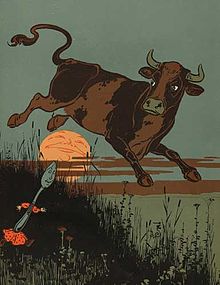Hey Diddle Diddle
| "Hey Diddle Diddle" | |
|---|---|

Illustration by William Wallace Denslow
|
|
| Nursery rhyme | |
| Published | c. 1765 |
"Hey Diddle Diddle" (also "Hi Diddle Diddle", "The Cat and the Fiddle", or "The Cow Jumped Over the Moon") is an English nursery rhyme. It has a Roud Folk Song Index number of 19478.
A common modern version of the rhyme is:
Hey diddle diddle,
The cat and the fiddle,
The cow jumped over the moon.
The little dog laughed,
To see such craft,
And the dish ran away with the spoon.
The rhyme may date back to at least the sixteenth century. There is a reference in Thomas Preston's play A lamentable tragedy mixed ful of pleasant mirth, conteyning the life of Cambises King of Percia, printed in 1569 that may refer to the rhyme:
They be at hand Sir with stick and fidle;
They can play a new dance called hey-didle-didle.
Another possible reference is in Alexander Montgomerie's The Cherry and the Slae from 1597:
But since you think't an easy thing
To mount above the moon,
Of your own fiddle take a spring
And dance when you have done.
The name "Cat and the Fiddle" was a common name for inns, including one known to have been at Old Chaunge, London by 1587.
The earliest recorded version of the poem resembling the modern form was printed around 1765 in London in Mother Goose's Melody with the lyrics:
Hey diddle diddle,
The Cat and the Fiddle,
The Cow jump'd over the Moon,
The little dog laugh'd to see such Craft,
And the Dish ran away with the Spoon.
There are numerous theories about the origin of the rhyme, including: James Orchard Halliwell's suggestion that it was a corruption of ancient Greek, probably advanced as a result of a deliberate hoax; that it was connected with Hathor worship; that it refers to various constellations (Taurus, Canis Minor, etc.); that it describes the Flight from Egypt; that it depicts Elizabeth, Lady Katherine Grey, and her relationships with the earls of Hertford and Leicester; that it deals with anti-clerical feeling over injunctions by Catholic priests for harder work; that it describes Katherine of Aragon (Katherine la Fidèle); Catherine, the wife of Peter the Great; Canton de Fidèle, a supposed governor of Calais and the game of cat (trap-ball). This profusion of unsupported explanations was satirised by J.R.R. Tolkien in his fictional explanations of 'The Man in the Moon Stayed Up Too Late'. Most scholarly commentators consider these to be unproven and state that the verse is probably meant to be simply nonsense.
...
Wikipedia
